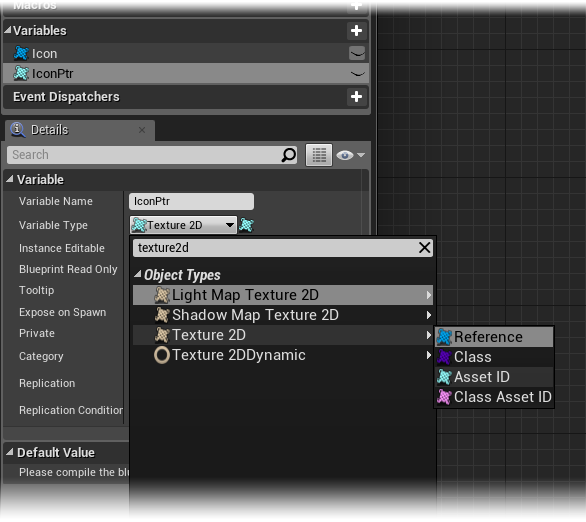By default, Unreal is greedy in the way it loads assets, so when you access
a UObject, all of its dependent resources are usually in-memory. For example,
it's possible to access the texture associated with a UTexture2D* variable.
It's also possible to access TSubclassOf<T> variables and call
GetDefaultObject() without worrying about whether the default object is
in-memory.
Sometimes, however, this greedy-loading can work against us. Huge assets can be loaded when they are not needed, increasing our loads times and memory footprint.
The way to stop assets being loaded automatically is to use TAssetPtr<T> and
TAssetSubclassOf<T>:
UTexture2D*becomesTAssetPtr<UTexture2D>TSubclassOf<UPlantDefinition>becomesTAssetSubclassOf<UPlantDefinition>
To understand how to use both of these, let's go through an example.
Defining Our Data
For example imagine you are making a farm simulation game, and your growable
plant properties are defined in inside Blueprint subclasses of
UPlantDefinition. Every plant has a large 1024x1024 pixel illustration that
is viewable in an optional "details view" for each plant. It doesn't make sense
for this texture to be loaded when the game starts, as it's almost never seen.
Also if the game has tens of plant types the textures can really impact
memory footprint and load times.
In Blueprints
How to create a TAssetPtr type property in Blueprints.
In C++
Instead our UPlantDefinition class definition would look like this
UCLASS()
class UPlantDefinition : public UDataAsset
{
GENERATED_BODY()
public:
UPROPERTY(BlueprintReadOnly, EditDefaultsOnly, Category="Plant")
TAssetPtr<UTexture2D> LargeImagePtr;
};
Loading TAssetPtr<T> Data
Asynchronously (and synchronously) loading data is supported in both Blueprints and C++. Blueprints is a little easier:
In Blueprints
Loading a Asset ID variable asynchronously in a Blueprint.
The asset returned by Load Asset is a plain UObject so we must cast it to our expected type.
In C++
Life in C++, as always, is a little more interesting.
Create a FStreamableManager
In order to load our TAssetPtr<T> resources, we need an instance of FStreamableManager that sticks around. There are a bunch of places you could put this instance, and to be honest I'm not 100% sure where is the "best". You could put it inside GameInstance, a custom game singleton, maybe even GameState.
Loading an Array of Assets
void UMyStreamExample::Setup()
{
TArray<FStringAssetReference> ToStream;
for (auto SomePtr : MyAssets)
{
ToStream.Add(SomePtr.ToStringReference());
}
// Getting our StreamableManager
StreamableManager.RequestAsyncLoad(ToStream,
FStreamableDelegate::CreateUObject(this,
UMyStreamExample::OnAssetsLoaded
)
);
}
void UMyStreamExample::OnAssetsLoaded()
{
// Do something
}



